Israel gearing up to strike Hamas stronghold
Fox News senior strategic analyst Gen. Jack Keane (Ret.) joins 'America's Newsroom' to discuss Israel's ground operations in Gaza after Hamas fighters were found in the Al-Shifa hospital and Netanyahu's criticism of Sen. Chuck Schumer's remarks.
JERUSALEM – Following Secretary of State Antony Blinken's Thursday meeting with his Egyptian counterpart in Cairo, a press release noted, "The Secretary reiterated the United States’ rejection of any forced displacement of Palestinians from Gaza," and while forced displacement is not on the table, some analysts wonder why regional countries won't give, at the very minimum, temporary refuge to the Palestinians in Gaza.
Images of malnourished children and desperate civilians seeking food and water in the war-torn Gaza Strip have flooded both mainstream and social media channels in recent weeks and damning reports by relief organizations have accused Israel of holding up crucial aid deliveries. Yet the reaction of the international community is to force those people to keep living in an ever-worsening humanitarian situation.
Requests for an explanation by Fox News Digital on this policy from both regional nations, who in the past have offered refuge to civilians escaping wars in Syria, Iraq and Sudan, and from international organizations that have galvanized to help refugees from other war-torn lands, were either met with silence or with a one-dimensional statement emphasizing that Gazans should not be forced to leave the coastal enclave.
None of the responses addressed people in Gaza who are desperate to get themselves or their families out of harm’s way, even temporarily, until a cease-fire is declared. They also did not address the reality that much of Gaza’s housing and civilian infrastructure has been destroyed by five months of fighting and could take years to rebuild.
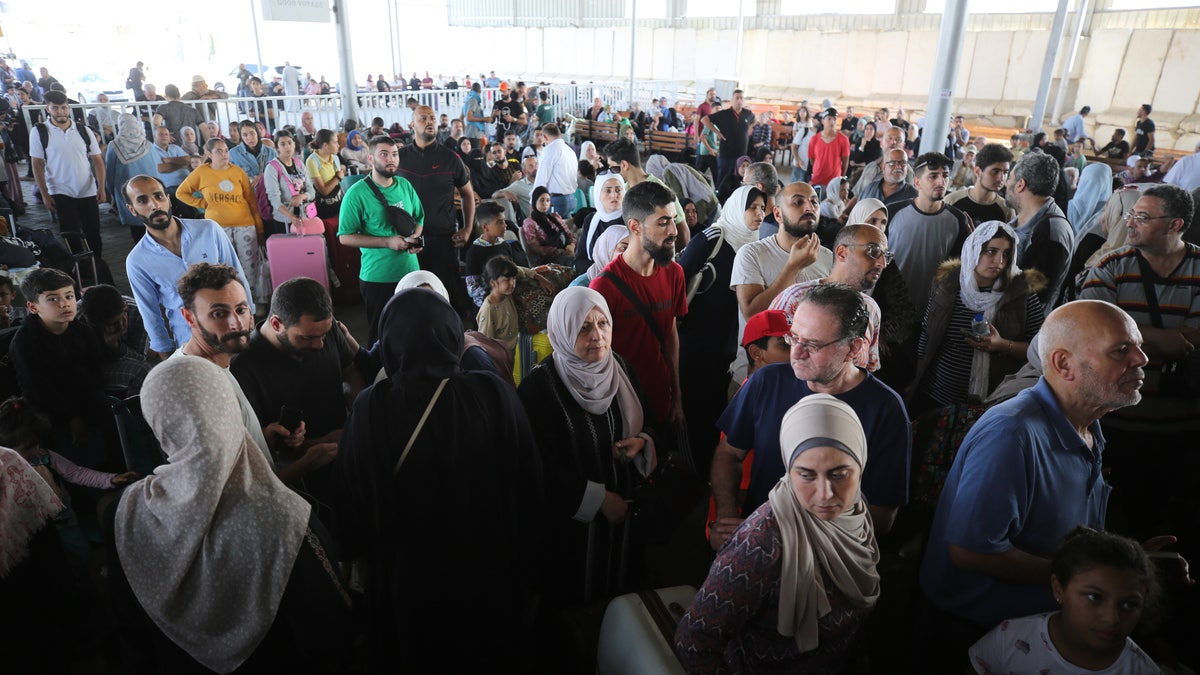
Gazan residents and other foreign nationals wait at the Rafah border crossing in the southern Gaza Strip to enter Egypt on Nov 1, 2023. (Majdi Fathi/TPS)
"We are now watching a black comedy scene where Israel is pleading with the Palestinian civilians to empty the areas where Hamas terrorists are hiding, so the Israeli forces can target them, while Arab states and even some Western powers and international organizations are urging and even forcing the Palestinian people to remain in a dangerous territory of war," Dalia Ziada, director of MEEM Center for Middle East and East Mediterranean Studies, told Fox News Digital.
"These Arab states and international organizations will later blame Israel for carrying out disproportionate attacks in densely populated areas where Hamas terrorists are purposefully hiding among Palestinian civilians," she said.
Ziada, an Egyptian national who was forced to flee her native Cairo after condemning Hamas for its brutal terror attack in Southern Israel on Oct. 7, said that since Israel’s creation in 1948, Arab leaders have perpetuated propaganda that accepting Palestinian refugees "undermines the so-called Palestinian cause and will allow Israel to take control of the entire disputed territories."
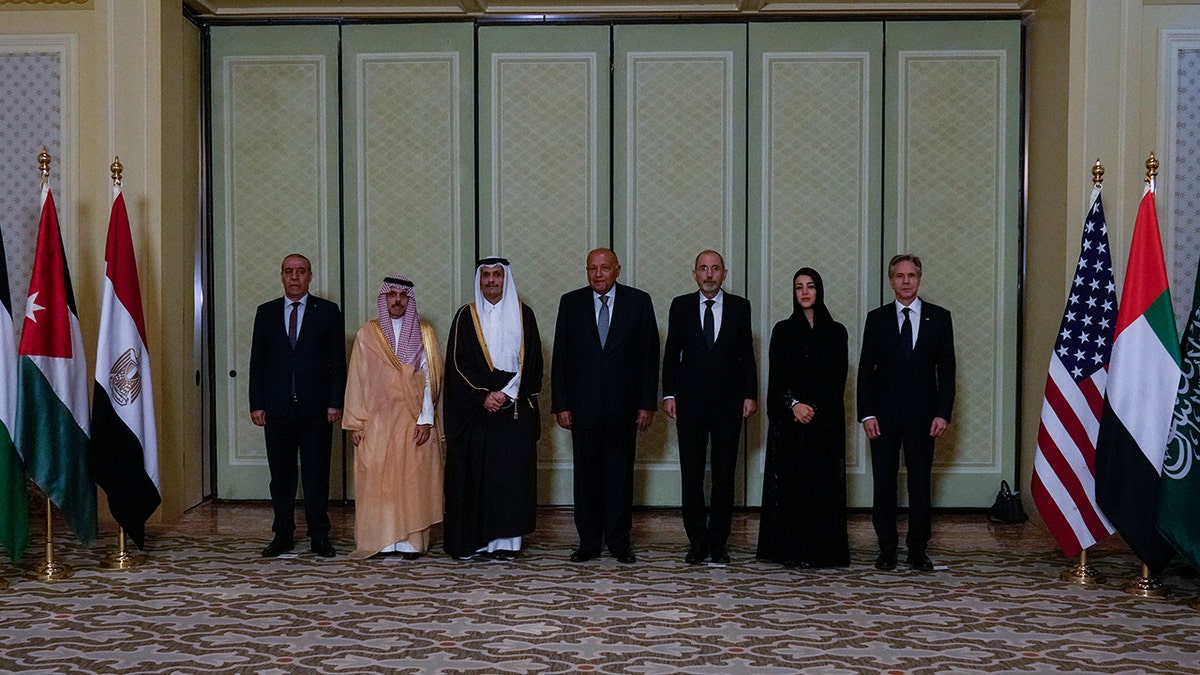
From right to left, U.S. Secretary of State Antony Blinken, UAE Minister of State for International Cooperation, Reem Ibrahim Al Hashimi, Jordanian Foreign Minister Ayman Safadi, Egyptian Foreign Minister Sameh Shoukry, Qatari Foreign Minister Sheikh Mohammed bin Abdulrahman bin Jassim Al Thani, Saudi Arabia's Foreign Minister Prince Faisal bin Farhan and Secretary-General of the Executive Committee of the Palestine Liberation Organisation (PLO) Hussein Al-Sheikh, pose for a group picture before their meeting in Cairo, Egypt, Thursday, March 21, 2024 (AP Photo/Amr Nabil)
"Recently, the narrative has changed a little to justify the rejection of receiving Palestinian refugees, especially in countries like Egypt and Jordan, which are the immediate neighbors of the current crisis," she said, noting that instead of allowing those fleeing the violence to enter, Egypt has claimed that opening its doors to Palestinian refugees, even temporarily, would constitute a threat to the country’s national security.
Instead, the Arab country, which shares a direct border and land crossing with the Gaza Strip, has bolstered its defenses with additional soldiers and reinforced the wall along the Egypt-Gaza border.
ODDS OF ISRAEL-HEZBOLLAH WAR 'INEVITABLE,' EXPERTS FEAR: 'TOTALLY PESSIMISTIC'
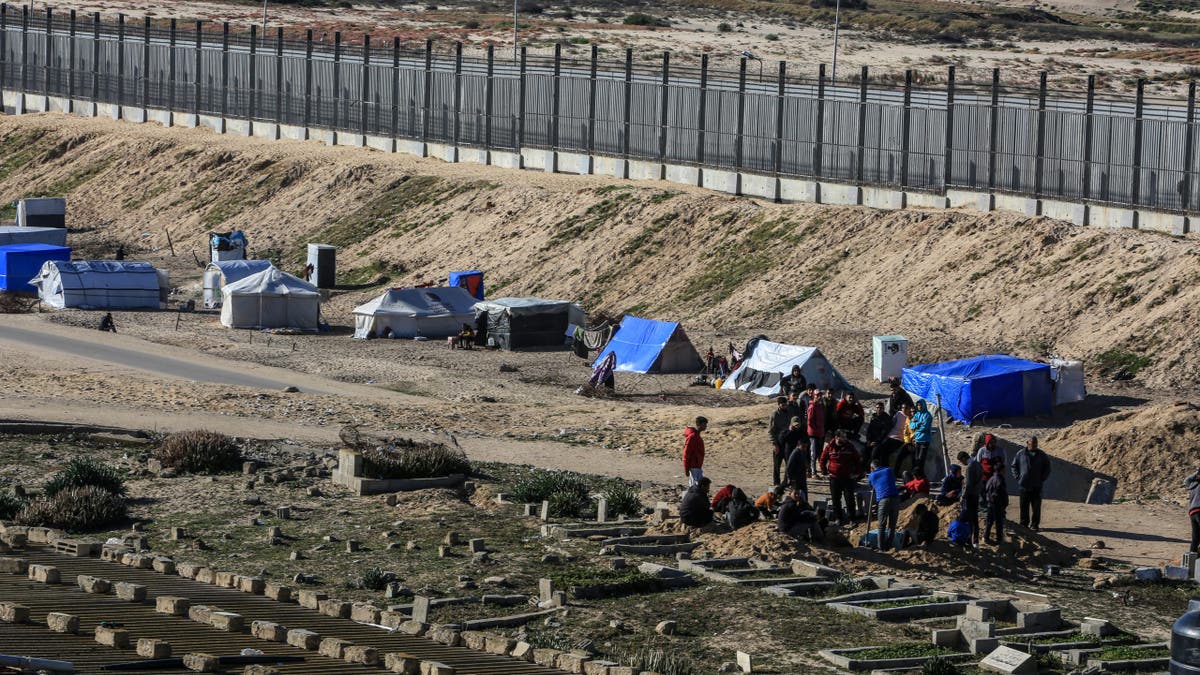
RAFAH, GAZA - MARCH 08: A view of the makeshift tents set up near the border of Egypt as Israeli attacks continue on March 08, 2024, in Rafah, Gaza. Thousands of Palestinian families were forced to leave their homes and seek refuge in Rafah and struggle every day to meet their food, water and basic needs due to the ongoing attacks and the lack of aid. (Abed Rahim Khatib/Anadolu via Getty Images)
Reports have also surfaced recently that an officially sanctioned Egyptian travel company has been charging exorbitant amounts to Palestinians who do want to leave the Strip. An in-depth story published earlier this month by U.K. outlet Sky News detailed how Gazans are being charged as much as $5,000 per adult and $2,500 a child by an Egyptian travel agency, Hala, to arrange passage through the border crossing and into the safety of the Sinai Peninsula. Before the war started, it was possible to arrange travel via the agency for only $350 per person.
Officially, Egypt has allowed only foreign nationals and the injured to leave Gaza since the war started in October, the report said. It noted, however, that the number of medical evacuees and foreign nationals leaving was much less than those who had paid to leave. The report said that while Hala was not listed as an official government service, all entry into Egypt is monitored by the border authority.
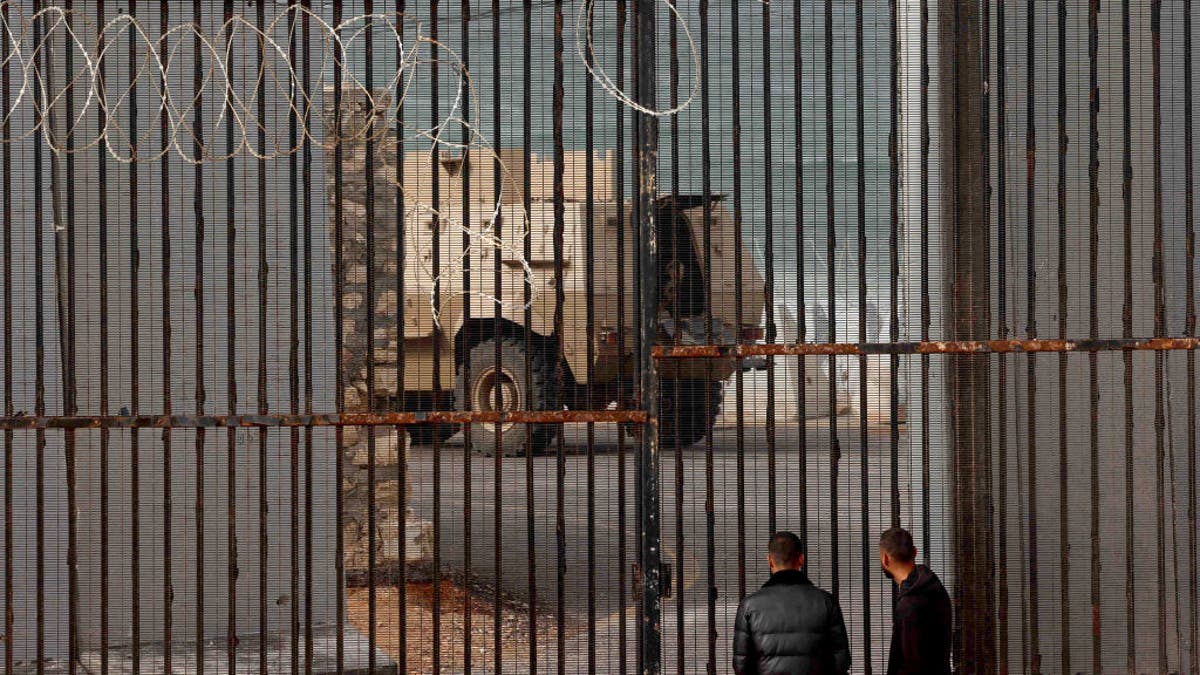
Displaced Palestinian men watch as an Egyptian army armored personnel carrier drives near the border fence between Gaza and Egypt, on February 16, 2024 in Rafah, in the southern Gaza Strip, amid the ongoing conflict between Israel and Hamas. (Photo by MOHAMMED ABED/AFP via Getty Images)
Mustafa Barghouti, head of the Palestinian National Initiative faction and a member of the Palestinian parliament in the West Bank, told Fox News Digital that charging Palestinians to leave Gaza was "wrong" but, he noted, the number of people who actually wanted to escape the Strip is "very small."
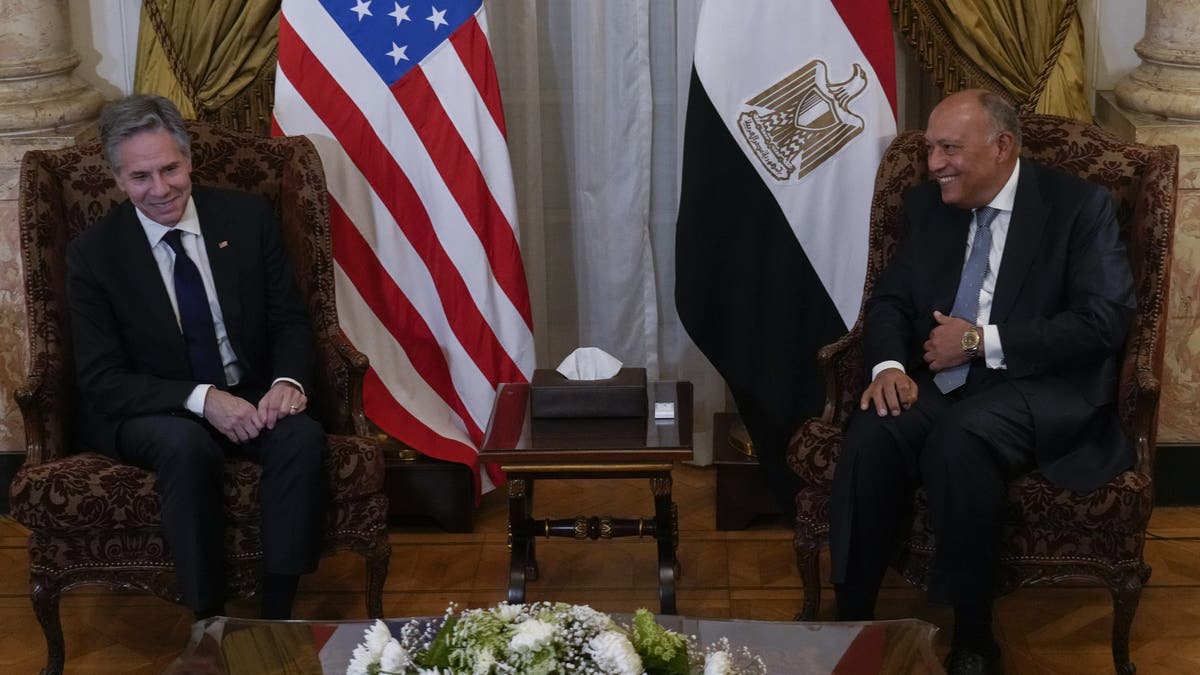
Egyptian Foreign Minister Sameh Shoukry, right, meets U.S. Secretary of State Antony Blinken, left, at Tahrir palace in Cairo, Egypt, Thursday, March 21, 2024. Photo: AP Photo/Amr Nabil (AP Photo/Amr Nabil)
"The Palestinian people do not want to be refugees again," he said. "Some already became refugees in the past and they do not want to be forced out again."
"Nobody will accept the eviction of people from Gaza, this is Israel’s plan – the cleansing of Gaza – and it is something that we cannot accept," Barghouti said. "The question is why Israel is not allowing sufficient aid into Gaza, why there are thousands and thousands of trucks waiting to enter? The question is why is Israel bombarding civilian areas and why has Israel destroyed our hospitals and our universities?"
He also said that Israel was actively preventing injured individuals from leaving Gaza, suggesting that out of some 16,000 that needed to leave for medical treatment, only four had been permitted to leave.
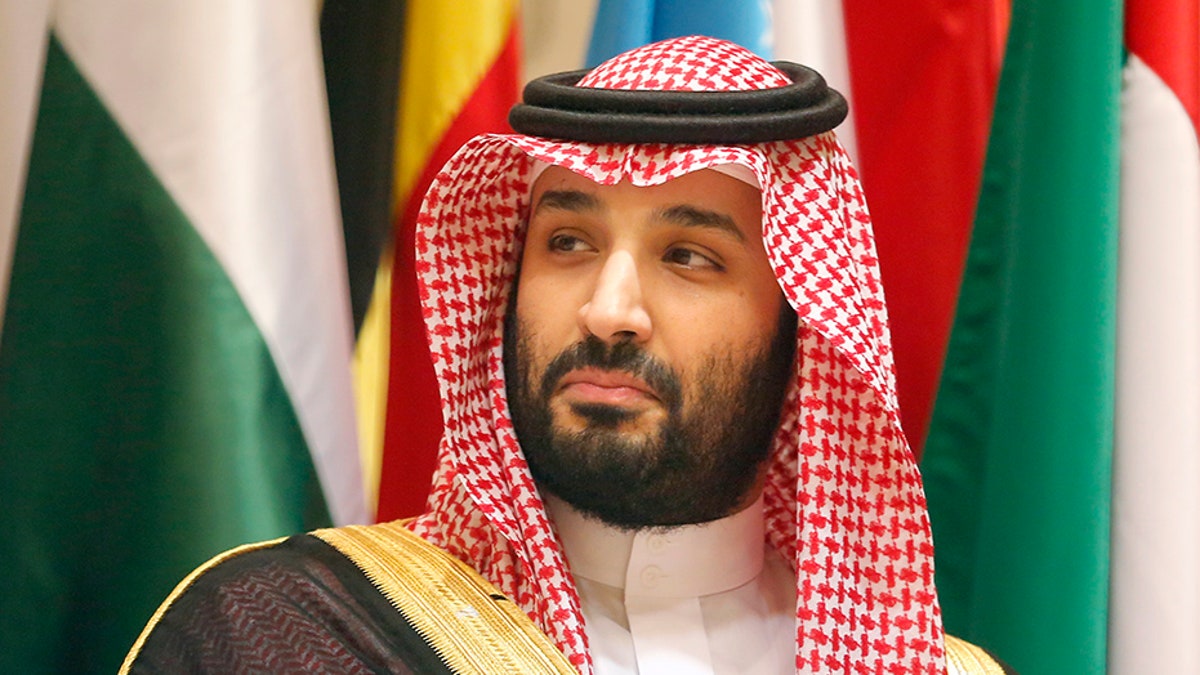
Saudi Crown Prince Mohammed bin Salman during the Islamic Summit of the Organization of Islamic Cooperation in Mecca, Saudi Arabia. (AP)
A spokesman for COGAT, the Israeli military authority that coordinates between Israel and the Palestinian Authority, told Fox News Digital that some 3,200 injured Palestinians had been permitted to leave Gaza for medical treatment since the war began.
While Barghouti said that the Palestinian Authority would be willing to allow refugees from Gaza to move to the West Bank, if Israel would allow it, Arab states in the region have not been so eager to allow entry to Palestinian refugees. Some are actively even blocking it, by refusing to issue visas to Palestinian passports holders and all underscore the point that they do not want to be complicit in a forced evacuation. They speculate that Israel will not allow those who leave to return, despite comments by Israel’s foreign minister and others to the contrary.
Tal Heinrich, a spokesperson for Israeli Prime Minister Benjamin Netanyahu, told Fox News Digital that Israeli government policy was that "the future of Gazan Palestinians is in Gaza."
"The Palestinians in Gaza are temporarily displaced within Gaza as a result of the war that Hamas waged on us on Oct 7," she said. "Reconstruction of the strip after the elimination of Hamas should be intertwined with de-radicalization efforts of the Palestinian society."
Fahad Nazar, a spokesman for Saudi Arabia’s embassy in Washington, said his country "rejected and condemned the forced displacement of Palestinians, who want to return to their homes and are not interested in seeking refuge in other countries."
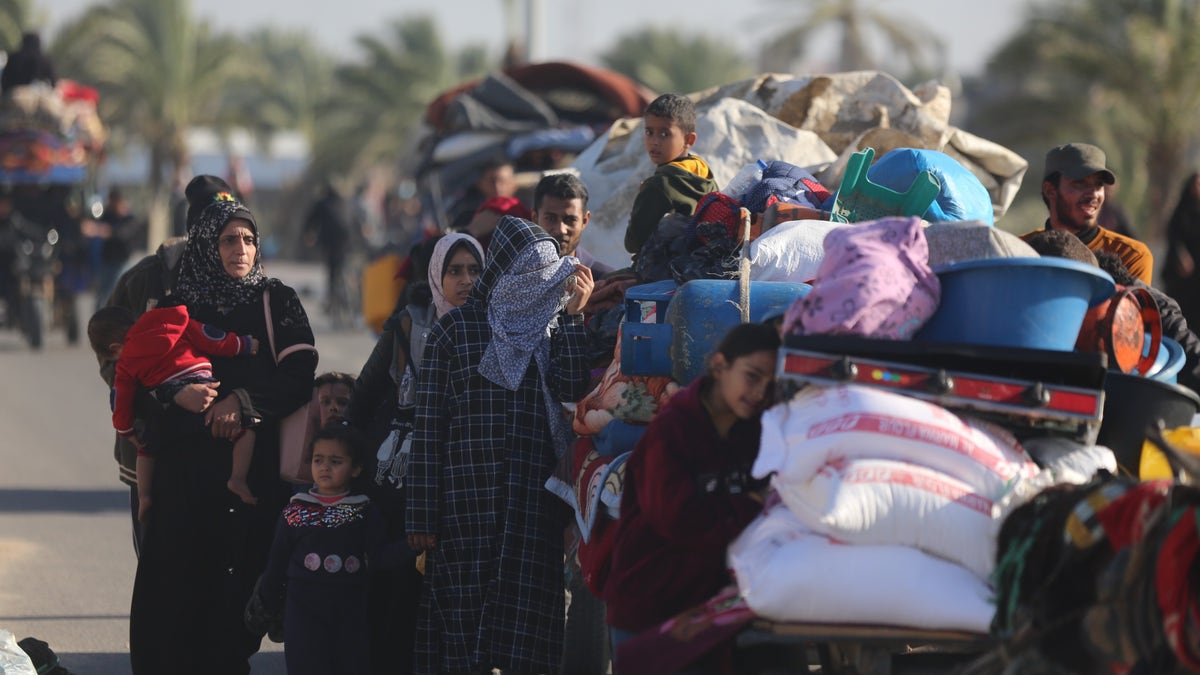
Hundreds of families in Khan Yunis leave for Rafah in the south through a humanitarian corridor opened by the IDF, on Jan 22, 2024. (Majdi Fathi/TPS)
Salman Al-Ansari, a prominent geopolitical analyst from Saudi Arabia, told Fox News Digital that the idea that Arab countries should take in Palestinian refugees "has been misconstrued and misrepresented."
"The Saudis, Egyptians, and Jordanians know for a fact that accepting Gazans as refugees would mean an end to the Palestinians’ rights to their own lands," he said. "It’s obvious that the Israeli wishful plan is to simply empty Gaza of its inhabitants. Once they are gone, they will never return."
"Throwing blame on Arab countries for their refusal to take in Palestinian refugees is nothing but a red herring," Al-Ansari said. "The solution lies in not causing more death and destruction and in opening multiple and safe humanitarian corridors, establishing a truce, and most importantly, creating a clear path to ending the occupation and implementing U.N. Security Council Resolution 242."
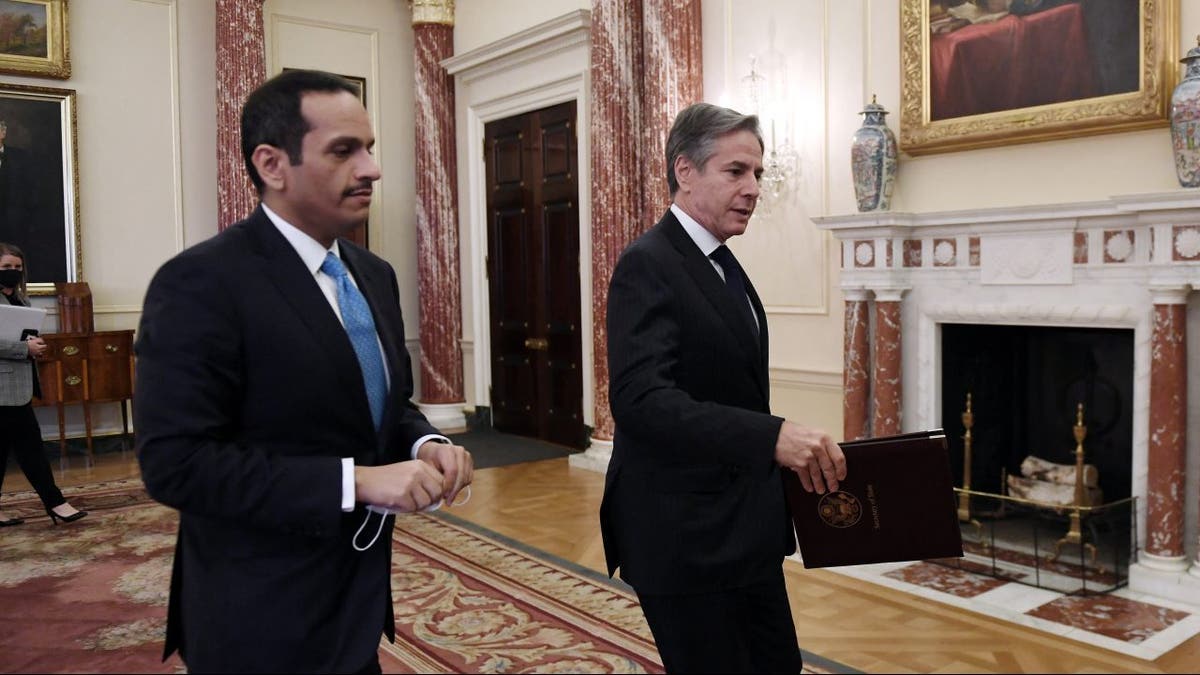
Secretary of State Antony Blinken and Qatar's Foreign Minister Sheikh Mohammed bin Abdulrahman Al Thani depart after a news conference at the State Department in Washington, D.C., on Nov. 12 , 2021. (Olivier Douliery/Pool via Reuters)
While most senior ministers in Israel’s current government have stated that Gazan civilians will be allowed to remain or return to the territory, even if the Jewish state maintains security control, some far-right members of Netanyahu’s government have made comments that Israeli settlements should be rebuilt there. Until 2005, Israel had several military bases and civilian communities in Gaza.
"This far-right Israeli government harbors some delusional ideas that they can simply empty Gaza of its inhabitants by leveling the entire Gaza Strip and making it uninhabitable," Al-Ansari said. "This is a very dangerous policy that could backfire on the entire region and on U.S. interests in the Middle East."
BIDEN'S VISION FOR A PALESTINIAN STATE DOOMED, EXPERTS SAY: 'AN EXPLICIT RECOGNITION OF HAMAS'
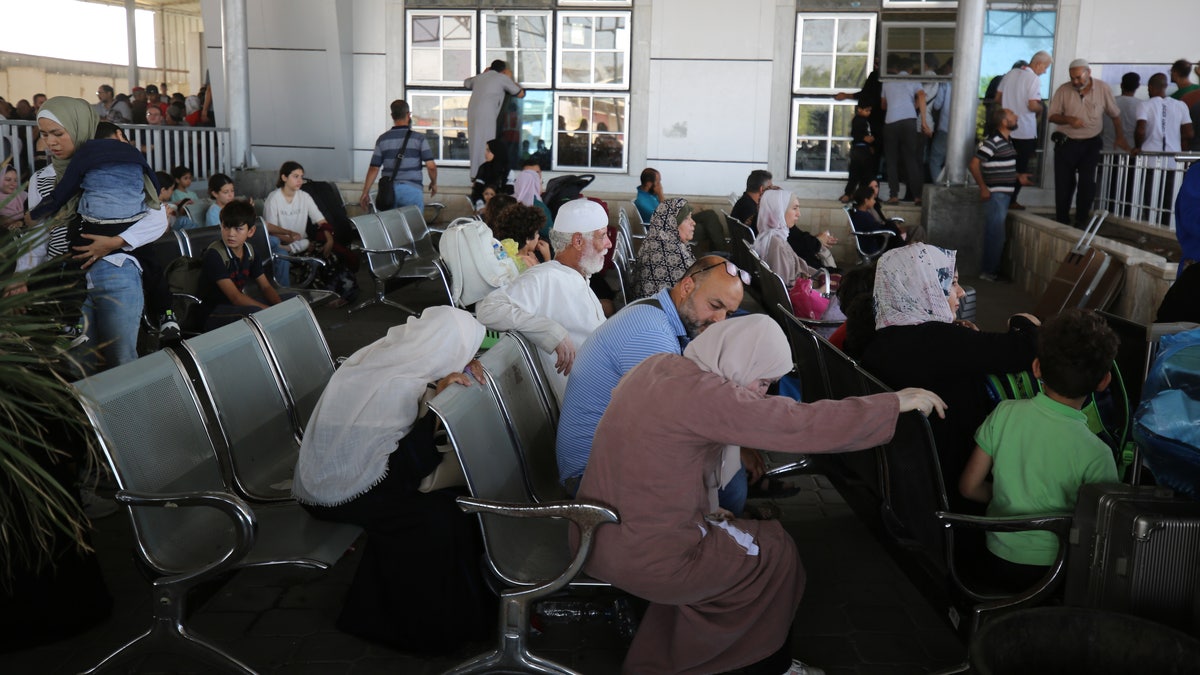
Gazans and other foreign nationals wait at the Rafah border crossing on Nov 1, 2023. ( Majdi Fathi/TPS)
A State Department spokesperson told Fox News Digital that the overall goal of his trip was to "discuss efforts to reach an immediate cease-fire agreement that secures the release of all remaining hostages, intensified international efforts to increase humanitarian assistance to Gaza, and coordination on post-conflict planning for Gaza."
Asked if he would raise the question of refuge for Gazans who want to leave, the spokesperson said Blinken had previously"made clear there should be no forceable displacement of Palestinians from Gaza."
At the United Nations, which advocates for and assists with refugees from many other war zones, Farhan Haq, the deputy spokesman for U.N. Secretary-General Antonio Guterres, also said, "Palestinians should be safe wherever they choose to be and should not be moved out of Gaza against their will."
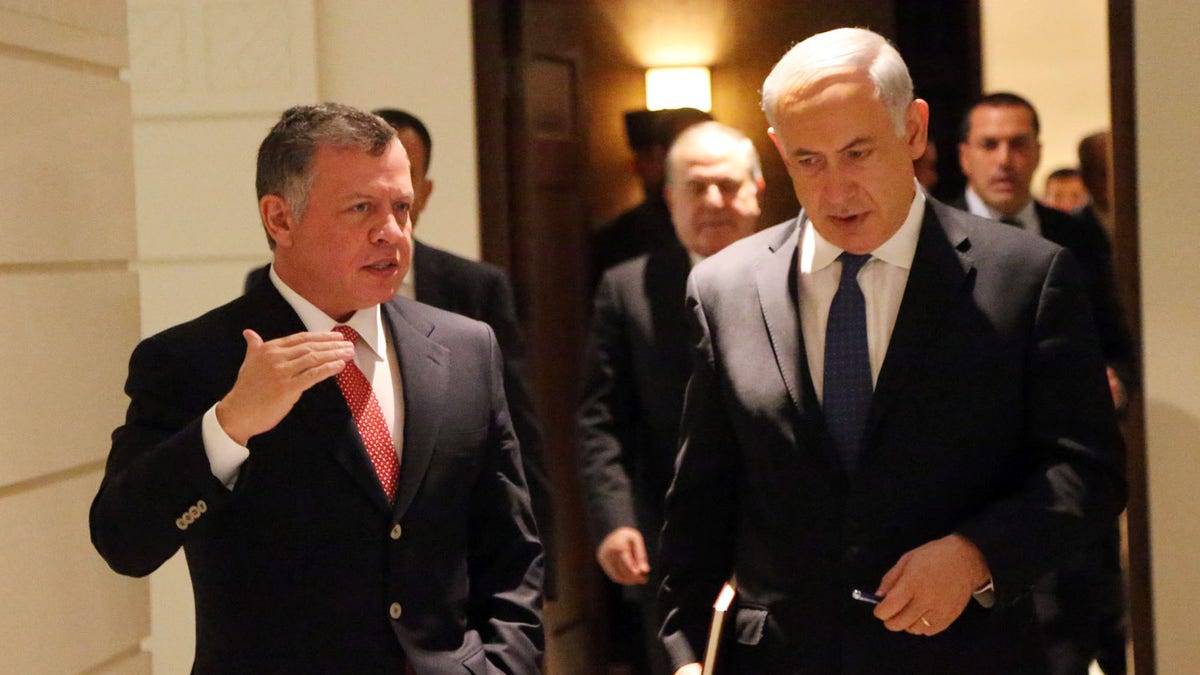
Prime Minister Benjamin Netanyahu meets Jordan's King Abdullah II during a visit to Amman on Jan. 16, 2014. (Jordanian Royal Court via Getty Images)
"Our focus remains on ensuring their safety and protection in Gaza, which is why the secretary-general continues to push for a humanitarian ceasefire," he said.
Egyptian analyst Ziada said the only way to explain the indifference of Arab countries to the suffering of Palestinian civilians is that "Arab leaders do not really want to carry the burden of rescuing them."
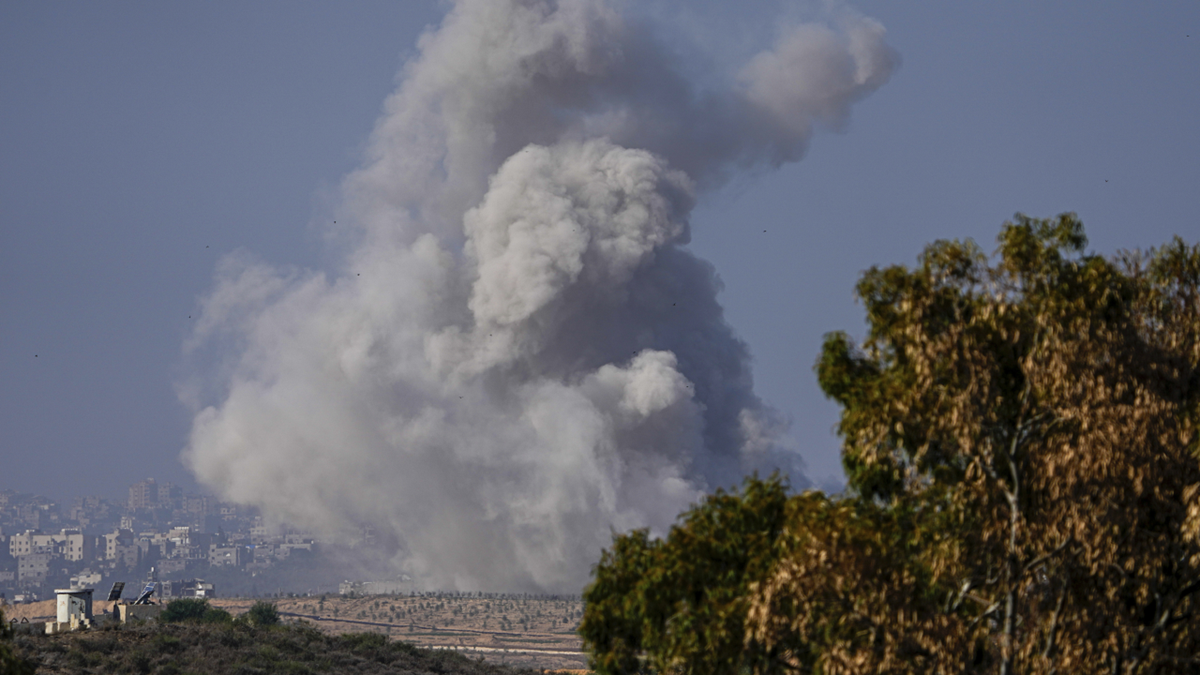
Smoke rises following an Israeli airstrike in the Gaza Strip as seen from southern Israel on Dec. 1. (AP/Ariel Schalit)
CLICK HERE TO GET THE FOX NEWS APP
"They only chose to curse Israel and sing love to the Palestinians to avoid doubling the outrage against them from their citizens, who are extremely depressed by the leaders’ political and economic failure," she said. "I am sad to say that it is in the best interest of Arab leaders right now for the war to keep going and for the Palestinian civilians to keep suffering, so they have a tool to distract their own people from their failures in running state affairs and as a way to solidify their positions in power for as long as they can."
Secretary of State Blinken ends his trip to the region on Friday in Israel, having stopped in Saudi Arabia and Egypt.
Fox News Digital reached out to the spokespeople from the Washington embassies of Qatar, the UAE, Egypt and Jordan but didn't get a response.










































